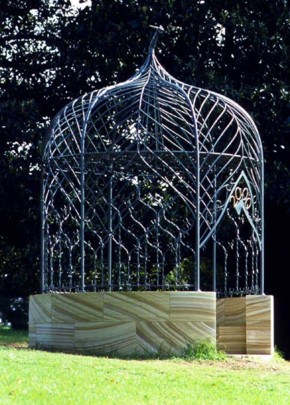The Dismissal
Exciting as the story of the bridge opening is, the more scholarly version of the dismissal is much more interesting. At the height of the Depression the 'Lang Plan' was, among other things, to unilaterally limit interest paid on foreign loans to 3% and to abandon the Gold standard.
Unilateral State action was contrary to the relatively new Australian Constitution and in serious opposition to the Federal, Scullin, Labor Government that had already gained the support of the High Court on this matter. Lang asserted that the Commonwealth was trying to 'enslave the people of NSW' and this was 'illegal throughout the British Empire'.
Lange then defaulted on interest payments due to British investors and the Scullen Federal Labor Government picked up the bill: £958 763. To recover the funds the Commonwealth passed the Financial Agreements Enforcement Act 1932.
In defiance 'the big fella' ordered Treasury officials visit two Sydney banks and draw out over a million pounds in cash. This was subsequently taken to the Trades Hall where it could be guarded by loyal Labor Party supporters. He also issued a circular instructing public servants not to pay money into the Federal Treasury as required by the new law.
To top off this 'banana republic' style stunt, he reputedly threatened to gaol Governor Game when he demurred. Game had judged the Lang circular and his related actions to be illegal.
Commonwealth troops were briefly mobilised in support of the Governor.
Popular movements were also involved and tensions ran high. On 13 May it was reported that a brigade of several hundred men of the 37,000 strong New Guard, a pro-monarchist anti-communist organisation mainly comprising returned servicemen (that included Captain De Groot) had allegedly assembled in the basement of David Jones department store near Parliament House. They allegedly intended to march on Parliament House and stage a coup d'état if Lang did not resign before seven o'clock.
The New Guard had already, allegedly, been foiled in an attempt to kidnap the Premier in Parramatta Road; after which, it was further alleged, they intended to incarcerate him in the disused Berrima Jail and take over the Government! Were they mad? Could any sane person expect this plan to succeed?
It is easy to think that it was Lang himself (or a media adviser) who invented this story. But ridiculous and unworkable as this plan seems today, it is hardly more bizarre that moving a million pounds in State finances, in cash, to the Trades Hall.
In response to the perceived threat; the Trades Hall; Parliament House; and other possible targets in Sydney; were apparently being guarded by the New South Wales Police. But the Police were in an interesting position; many were ex-servicemen and not a few were allegedly members of the New Guard.
The Police are legally responsible to the Governor. But Lang claimed their loyalty should first be to his Government and extended beyond their duty to protect property and guard against affray and insurrection.
This was soon put to the test. Game successfully dismissed Lang at six o'clock on the evening of 13 May 1932. Lang apparently took his dismissal with relief: 'I must be going', he said, 'I am no longer Premier but a free man. I have attempted to do my duty'. At least one contemporary claimed he had actually sought dismissal.
It was perhaps the closest to civil war that Australia has ever come. So that is how big Jack Lang got dismissed. Governor Game, not the Premier, had the support of the people. An election was held in June and Lang was comprehensively defeated. Labor more than half its seats from 55 to 24.
With the defeat of Lang the New Guard lost its main 'raison d'être'; and its support and membership faded away.
There is an interesting side story. Lang had his election campaign advertising paid for by a man appropriately called Swindell. Swindell held the patent rights for the 'tin hare' that made gambling on greyhound racing practical. Greyhound racing became hugely popular among poorer and working-class Sydneysiders during the depression, who could own a dog, enjoyed the excitement and saw gambling (or rigging races) as the only way of escaping their poverty.
Several prominent Sydney business men were also involved and Lang issued 12 licences to this goldmine; that was also a partial solution to the States failing finances. The 'tin hares' issue was comparable to today's poker machines controversy; 'on steroids'. Loto, lotteries and poker machines are still referred to in government as 'a tax on stupidity' or sometimes a 'tax on poverty'. Welfare organisations, churches and temperance movements, characterised as 'wowsers' by Lang, were up in arms over the financial devastation the 'tin hare' was reeking on already poor families; and leant their voice to calls for Lang to go.
The pattern of the dismissal of this unpopular Government; followed by its comprehensive defeat at the following election; was repeated Federally in 1975. In both cases the legality of the dismissal is still disputed by some.
But this 'dismissal' power is central to our democracy. It is the ultimate check on the unfettered abuse of parliamentary power and the central reason for our remaining a constitutional monarchy nationally; and thus within the States.
We have, so far, proven incapable of coming up with an alternative republican model that would ensure that a President, to replace the Governor General, would be similarly independent of the electoral circus and of consequent political, factional or fund raising influence; and to ensure that a President would not challenge, on political or electoral grounds, the primacy of the Prime Minister or the authority of the Parliament.

